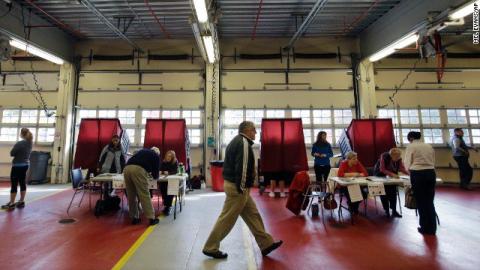Millions of New Jersey voters were faced with a difficult decision Tuesday: Join a party or don't vote at all.
That’s because the first stage of New Jersey’s taxpayer-funded and publicly-administered elections are open to Republicans and Democrats only. So, for a plurality of New Jersey voters who choose not to join either party -- too bad.
New Jersey held its 2017 primary election on Tuesday, June 6. Lt. Governor and Secretary of State Kim Guadagno easily won the Republican nomination for governor with 47% of the vote. She will face Phil Murphy in the November general election -- the Democratic Party favorite.
The primary election got an unusually high level of national coverage for a New Jersey race as several national outlets propped it up as a referendum on Gov. Chris Christie. Left undiscussed, however, is the low voter turnout and the total exclusion of independent voters from New Jersey’s primary election process.
Over 2.4 million voters in New Jersey could not participate in Tuesday's primary unless they re-registered with the Republican or Democratic Party. That is because, in New Jersey, voters are forced to join either the Democratic Party or the Republican Party as a condition of participating.
ALSO READ: NJ Voters Spend $100 Million on Elections They Can’t Participate In
So, with all the talk of hyper-partisanship in Washington DC, why doesn’t anyone talk about the natural consequences of excluding independent voters from the first and often most important part of the public election process?
Fact is, both parties hold a monopoly over the primary elections in New Jersey. This means only members of the Republican and Democratic parties get to vote.
Sound unfair?
Well, a nonpartisan coalition led by the Independent Voter Project filed a lawsuit in 2014, challenging the state's closed primary law. The coalition made a pretty simple argument: forcing a voter to join a private organization as a condition of participating at an important stage of the election process violates our First Amendment right of non-association.
In other words, you shouldn’t have to join a party to vote.
Secretary of State Kim Guadagno disagrees. She defended the closed primary in court and argued that if voters want to participate in the taxpayer-funded election, the 2.4 million New Jersey voters who are registered independent should “simply join a party.”
A federal district court and the Third Circuit Court of Appeal ruled against the plaintiffs, holding that voters do not have a fundamental right to vote in a primary election in New Jersey until they join a party.
Yes, that’s the ruling. Seriously. Read it for yourself:
Is that how fundamental rights work?
ALSO READ: Guadagno for Governor: Join a Party or Don’t Vote
Plaintiffs filed a writ of certiorari to the Supreme Court of the United States, but the court has chosen not to hear the case, at least for now.
In any case, Kim Guadagno and Phil Murphy are the victors of a primary election system that serves parties, not people.
This November, the rest of the voters will join in the fun of “democracy,” and the media will find out whether independent New Jersey will go to the red team or the blue team.
